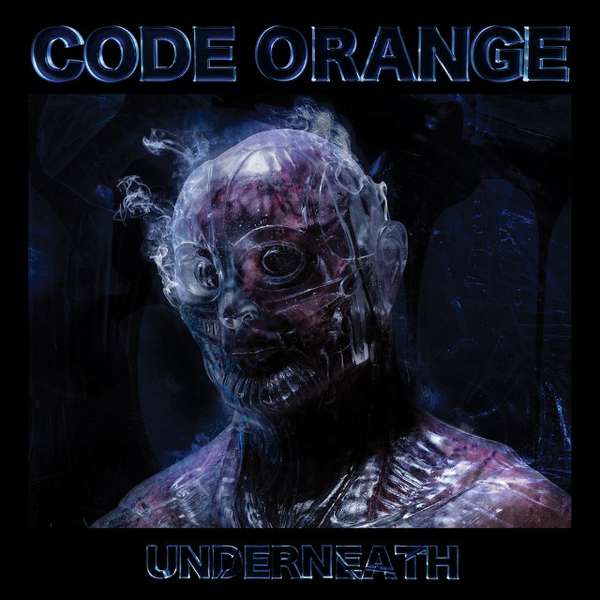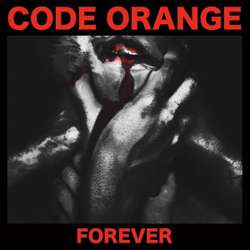What is it that even makes a good album, good? Good is a slippery concept of course, and your definition is going to be shaped and tinted by your life experience, environment, and even physiology (some people naturally just have more acute hearing than others). Tomes could, and have been written, about what combination of sounds constitutes an "objective," scientific consensus-driven definition of "goodness" and how it can be achieved. And they'd be wrong. Partially because whoever is enough of a simple, sheltered pet of our society's systems of solutionism to think that they reliably reduce the whole of human art making to a single data set, is also someone who clearly should not be recommendations about art, but also because whoever they are, I guarantee that they've never written and recorded an album like Underneath. A calculatingly fierce and meticulously monumental effort that has raised the bar for everyone one else who plans to release an album this year, whether they're in heavy metal's lane, or not. If there is a technical definition for "bad-ass" it now needs to include the phrase, See, Code Orange.
Underneath is the Code Orange's fourth album. A thorough reworking of their sound, and of hardcore in general. A lot has been made of the way that the album looks to heavy music's past in order to bring trends that had lost momentum into the forefront again, but this conversation misses the point of Underneath entirely. A lot of hardcore fans, myself included, have been extremely pleased to see synths, samples, and various sound sharpening tools be picked up by acts like Harm's Way, Jesus Piece, and Vein, and once again becoming part of the standard hardcore toolkit. However, reviving trends that dead-ended in the '00s clearly isn't Code Orange's aim here. Neither is paying tribute to their forbearers. They obviously love Hatebreed, Deftones, Sepultura, and Pantera. Who doesn't? No, what's actually interesting about Code Orange on Underneath is that they take these things that they love, that we all love, and break them. Shatter them to pieces of particularized razors and they then step barefoot onto in a mutilating perversion of a fire-walk, leaving a trail of shredded skin and bloody footprints to mark their path. Its evolution forced through pain and distress. An attempt to leave their old lives behind and become something new, unpredictable, and bold.
There have been points in the history of rock music when bands have attempted to crack the mold and step outside of the protective circle drawn around their various partisan camps. While such adventures often end in failure, there are many occasions when these excursions have yielded a mighty sum of pay dirt as well. Mike Patton has made a career of such prospecting maneuvers, and the Refused will forever be defined by their most ambitious record, released before the turn of the new Millennia. And now, I think it fair to say that Code Orange can add their name to this list of venerated innovators of untamed sonance.
Both I Am King and Forever represented a clean line of progression in terms of technical prowess, production, and confidence in their performance. Threads of death-obsessed noise-core cut with post-industrial Midwestern metalcore survive in the groove DNA of tracks like "Swallow the Rabbit Whole," "You and You Alone" and "Cold.Metal.Place," but they have been repurposed to serve more nefarious ends, with blast beats impressed into the service of unnatural rhythms and ripping stabs of anguished guitar chords struggling to breathe under a cloud of psychic-disturbance, the by-product of the band's embrace of a near neo-industrial aesthetic. A sound they have developed not from tutelage at the foot of a master, but through rouge experiments on the human body and mind, forgoing animal testing, for assured potency and impact. Experiments that have largely proved successful.
The convergent evolutionary track that the band has taken with the likes of Nine Inch Nails on Underneath does yield some familiar fruit although, not with the flavor that one would expect. "The Easy Way" has hints of Trent Reznor's characteristicly clawing cry, but the undulating, layered grooves, soul swallowing sudden-death whirlpools, and hollow haul-of-mirrors breakdowns and outro swarm and smother any past impressions that one could be relied on to gain stable footing. Possibly more familiar is the Vein-esque spark and shudder of "In Fear," but even there, allusions to Code Orange's contemporaries do little to prepare the listener for the slowly binding melody of the paralytic bridge, or the eviscerating touch of the reverse skin-graph outro.
One of the more popular moments on Forever was the moody, ice-toned, haunted house "Bleeding in the Blur," where guitarist Reba Meyers' chiding, clean vocals foretell a cataclysmic mental breakdown, with the help of leaky reverb tainted grunge guitars. Weary clean singing is utilized on Underneath as well, but with differing effects. The vocals on "Autumn and Carbon" slither over the frozen mud of cool gritty guitar tones push along by a downpressing groove that feels like its dragging you along a wintery path just long enough to find a place in the dirt that is soft and damp enough to suffocate you in. And then there is the closer, "Underneath" which feels like it barrows its mind shaving electronics from some combination of Author & Punisher and Rammstein, lending the track texture and gravity on which to ground a man-hunting groove that chases you up a hill only to throw you over a steep drop into a pond of acid. The interplay between Meyers' off-puttingly sharp and vindictive vocal performance and drummer Jami Morgan's black saliva spraying, panther-like howl cooperate to seal the deal. The title track would seem to be the albums thesis and peak, but I would contend that there is another moment on Underneath that exemplified its vicious intentions with as much exactitude. "Sulfur Surrounding" sees another intertwined, stranglehold like dance between Morgan and Meyers, accompanied by the lashing whip of weeping hooks, bone dislodging rattle of peeling electronics, and a transforming serrated groove that never cuts you the same way twice. Even with an absence any death vocals, "Sulfer Surrounding" allows the full dynamic range of the band's sound to emerge from the fog of insurgency to be revealed in its full and awful magnitude and beauty. It's enough to turn your hair white at the roots.
It's hard to get your mind around everything that happens on Underneath in one sitting, or even ten, as the Code Orange has packed so many ideas into the album's almost fifty-minutes run time to fill a trilogy of releases. And even then, the trio could hardly expound upon Underneath's finer details to exhaustion. Underneath is a Pandora-like fount of misery and complex emotional catharsis that I feel I could allow myself to sink into and never touch the bottom. A perpetual relapse into a sarcophagus of insatiable hunger. Code Orange has reset the scales of heaviness with this Underneath. Believe the hype.
See also
Mick is always writing about something he's heard. Possibly even something you'd like. You can read his stuff over at I Thought I Heard a Sound Blog.




